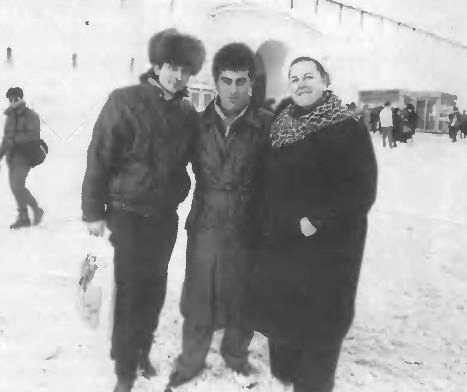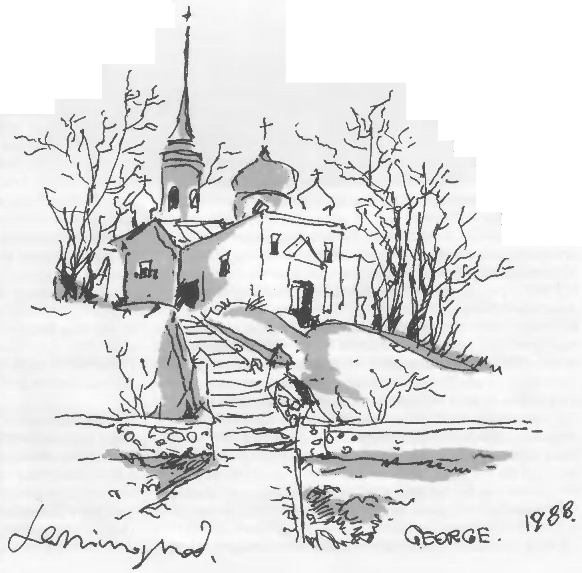![]()
The Words of the Bouma Family
|
|
The Words of the Bouma Family |

Andrei
and Garik, on a pilgrimage to Zagorsk Trinity Monastery, meet Erin as
she tours the grounds.
Erin Bouma has been editor of the "Soul of Russia" newsletter since 1987. This article is about her experiences during the World Media Association's Fifth Fact-finding Tour to the USSR, November 10-20, 1988.
I don't speak Russian yet, but since the Soul of Russia providence began three years ago, I have been praying for the people in that land. I wanted to be open to any possibilities to meet good Russian people, get to know them and give them a few small gifts I brought. I sought to reach out, beyond Intourist guides and the hotel staff, to ordinary Soviet citizens with little or no contact with foreigners and let them know that the world outside is thinking of them and loves them.
As a result, in ten short days in the Soviet Union, I met George, Garik and Andrei. They came into my life and brought me closer than ever to the Russian people and this historic time in their country. As I told Garik and Andrei when we parted on my final day, "Now that we are connected in heart, neither time nor space can come between us. This is not the end, but only the beginning of our spiritual relationship."
I was in Leningrad only half a day when I met George in a bookstore. He spoke English and offered to sell me Russian craft items in demand by tourists. His spirit was bright and I began asking him questions about himself. When I discovered that he was an artist, I asked him if he would take me to see an exhibition we had passed earlier during a city tour. He agreed, and a friend of his and a church brother accompanied us to the hall where Ilya Glazunov was showing his prophetic and nationalistic paintings to hundreds of Soviet citizens. I had read about this artist and the public response and I saw for myself the artist's bold use of crosses, Christ and biblical symbolism in his contemporary interpretation of events.
I was encouraged to meet George the next day, to view what he considered an even more meaningful exhibit. On Sunday, we took a cab across town to the Komsomol Youth Palace, where hundreds of Leningraders were lined up to see the art show. George told the director that an American journalist had arrived who would like to view the exhibit and I was ushered to the head of the line. This artist, Constantine Vasilev (1942-1976) also used much spiritual imagery to portray a Nordic Russian landscape and people with a mythic quality. Afterwards, George and I had Russian ice cream in the snack shop there.
Then, we went to a six-month old cooperative restaurant downtown where we spent the next three hours sharing.
George is unmarried, in his late 20s, spent two years in the Red Army (where he was threatened with a week in prison if he didn't paint communist slogans on banners), taught himself English, and is trying to pursue his art work against great odds. He is very interested in American culture and hopes to one day visit this country. I promised to write him a formal invitation to visit.
When I showed him photos of True Parents, George told me that his parents, from the province of Georgia and both devout believers, had 14 children. He saw me bless my food before I ate and asked me if I believed in God. When I said, "Yes," he then questioned: "All the time?" I assured him that my beliefs did not depend on my momentary fortunes and he was impressed.
He is not sure that he believes but he does place faith in the goodness in people. After dinner, George sketched a beautiful Russian country church as a gift for me. I want to send him some art supplies that he can't obtain at any price in Leningrad. The next time I am in Leningrad, George will show me his paintings and we can further pursue our new friendship. He walked me back to my hotel that evening and we reluctantly parted.
It was five days later at Zagorsk that I met Garik and Andrei. When I and a participant of the WMA tour came out of the Chapel's main sanctuary after witnessing the fervent faith of Russian believers, I noticed a young man walking near us, while we freely spoke English. I finally asked him, "Do you speak English?" and he responded, "Yes."
After a brief conversation, I learned that Garik was Armenian, single, and had studied law, but was presently living in Byelorussia near the Polish border and, through his belief in God, searching for a just society. He insisted on buying me a miniature icon and several Millennium pins and postcards from a Russian shop for believers. He began telling me about his friend who was in the church praying at the time. Fortunately, I was able to meet Andrei before our Intourist bus left to return to Moscow, and we had our pictures taken together. When our Intourist guide determined that Garik and Andei could not ride back to the city with us, I made an appointment to meet them outside my hotel in Moscow the next morning.
Garik and Andrei were prompt the next morning, though a bit cold since they had no gloves. We went in search of a warm place where we could relax and talk, and ended up close by at a state restaurant on top of a building overlooking Red Square. Andrei spoke no English so Garik graciously served as a translator. We ended up spending a total of seven hours there in deep discussion of spirituality and our lives.

Four years ago, Andrei spent three years in a mental hospital because he, as a young person, was attending church.
There he underwent drug and shock therapy for his "illness." This served to disorient and depress him, and leave him with a sense of guilt, but he did not lose his faith. A sensitive and spiritual young man from Byelorussia, Andrei is married with two beautiful young children. He is especially concerned that his son and daughter be kept spiritually alive in their present environment.
Andrei asked me to take a handwritten book of his religious poetry with me to the United States, have it translated, and tell him if it was any good. He was able to support himself by doing art work for his friends and by assisting at the local church. Andrei's questions about spiritual life were truly inspiring to me. Garik also understood much of what I was able to share.
I assured them both that God is a loving parent and that they were sons of God. I told them they could continue to grow spiritually with a teacher and by opening to the love that God is pouring out to them. I showed them True Parents' pictures and told them of, their mission to bring the world together as one family. They were both inspired. Andrei commented that he had to wait until he was 35 years old to hear these words of comfort and hope. His sad but pure spirit lifted throughout the afternoon and he declared that the torment in his mind which had triggered a 2-day fast and taken him in pilgrimage to the Monastery was cleared away. He said I reminded him of his mother, then said "No, all mothers."
Both Andrei and Garik felt we were meant to meet. It was difficult to leave them after experiencing such heartistic sharing, but I promised to write and see them again as soon as I could return.
They still had a long train trip (10 hours) ahead of them to return home to Byelorussia that night.
All this took place on my final day in Moscow. I made one more trip to Red Square and that evening our entire tour group took the overnight train to Helsinki and home. Even though I was physically exhausted by the strains of the trip, my heart was full, and connections I had made with the Soviet people inspired me with new hope.
I found three very hopeful sources of life in the Soviet Union in my short 10-day glimpse. One would be the devout and steadfast believers (primarily older babushkas, but also some monks and spiritual youths) not able to shake the tyranny of the system over them, but not dissuaded by it either. This group is represented, for me, by Andrei and his difficult course of spiritual suffering.
Then, there are the young democrats and activists, who vow to persist in challenging the once-terrifying and mono, lithic totalitarianism of the Communist Party state. These are the young people at the Independent University, the Democratic Unionists (including founders of the Memorial Committee to commemorate victims of Communist State crimes), and Garik in his search for "justice." They represent the more political, secular righteousness of a dynamic, educated force.
And finally, there is one group I haven't mentioned much, but was very impressed by. Often full of the most initiative and hardworking are the young entrepreneurs of the streets, many whom have taught themselves English, who take risks and "hustle" in the best capitalist traditions. These young men meet the tourist buses, identify non-Russians in a crowd and have discovered the reality of market principles. Although my relationship with George was non-commercial (and he also lives in the artistic, international circles in Leningrad), I feel that he represents the best of these "unofficial marketeers": creative, curious and outside the daily grind of Soviet life.
The future of Russia and/or the dissolved Soviet Empire belongs to these old and new energies which transcend socialist dogma and intimidation. They are not the front line of Gorbachev's troops but, as a young man from the Democratic Union expressed it: "We need the openings Gorbachev is affording us, and he needs us to prove to the world that the USSR practices some human rights." The future of the USSR, I believe, is in the destined interplay between these types of citizens. It will be both interesting and consequential. God has prepared these three forces to converge and unite to shape the destiny of the post-communist Slavic world.